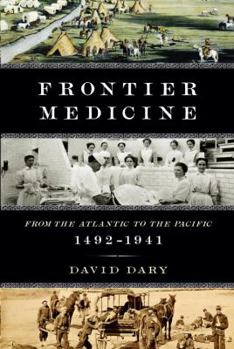Frontier Medicine: From the Atlantic to the Pacific, 1492-1941
Select Format
Select Condition 
Book Overview
In this intriguing narrative, David Dary charts how American medicine has evolved since 1492, when New World settlers first began combining European remedies with the traditional practices of the... This description may be from another edition of this product.
Format:Hardcover
Language:English
ISBN:0307263452
ISBN13:9780307263452
Release Date:November 2008
Publisher:Knopf Publishing Group
Length:381 Pages
Weight:1.75 lbs.
Dimensions:1.3" x 6.8" x 9.4"
Customer Reviews
3 ratings
You don't have to be interested in medicine to enjoy this book
Published by Thriftbooks.com User , 15 years ago
In this fascinating book, author David Dary tells the story of frontier medicine in the U.S. The book starts with an examination of Native-American medicinal lore, which never had a large affect on frontier medicine, but always lurked in its background, a figure of superstitious awe. After that, the book goes through the state of knowledge (or more often lack of knowledge) in the West, from the days of settlers to the days of Western sanitariums and quack medicines. Overall, I found this to be a very interesting book. It's the story of the growth of America, told through the story of the growth of America's ideas about health and medicine. The author did a great job of being exhaustive in his look at the history of medicine, telling so many stories that I had heard before, but many more stories that I had not. Now, you don't have to be interested in medicine to enjoy this book. Indeed, I would not normally consider myself such, but I really enjoyed all of the strange and surprising stories that the book tells. So, let me just say that I really enjoyed reading this book, and I do not hesitate to recommend it to everyone!
Books about the history of medicine
Published by Thriftbooks.com User , 15 years ago
Frontier Medicine: From the Atlantic to the Pacific, 1492-1941 This was a well written and researched book. Really fascinating to see how rudimentary early medicine was. Surprising the human race survived some of the barbaric practices. Interesting read!
A look at medical care in the old west
Published by Thriftbooks.com User , 15 years ago
"Frontier Medicine: from the Atlantic to the Pacific, 1492-1941" is a book which covers a much neglected part of the history of "the American West." It gives us a fascinating look at the earliest arrivals of Europeans to the shores of what later became the United States of America, and how the (often crude) medical skills of these pioneers, sometimes supplemented by herbal knowledge of the Indians, were used to treat injured or sick people. Reading this history about frontier medicine one wonders, not just at the almost total lack in that era of any medical knowledge about diseases and how to cure them and/or the way the human body works, but that so many people still managed to survive their treatments, often more deadly than the sicknesses they were suffering from. Especially to modern eyes, one shivers to think being visited by such a "medical professional" at ones sickbed, and being "treated" by bleeding, purging either by emetic or by enema, blistering, and/or medicines (those last often with ingredients that we would consider poison today) to get the "humors" of the human body back in its proper balance. Or, for that matter, being wounded in battle because almost inevitably the wound would become infected (sanitation was almost unheard off) and the only "remedy" was amputation of that body-part - which most didn't survive. Anyway, in "Frontier Medicine" we get an excellent overview of the very different groups of people who "came west". We start out with the Spanish, who arrived first in the Americas and who were later followed by the English and the French. The European medical knowledge of that time is covered, and how this was implemented by the pioneers and sometimes improved on by things learned from interactions with the Indians. We learn how the fur traders and trappers, sometimes for weeks or months alone in a vast wilderness, treated themselves when they became injured. Sometimes showcasing their immense hardiness as in the case of Hugh Glass, who was mauled by a bear and left for dead by his fellow travelers when he went into a coma, but recovered and literally crawled his way to survival (having used maggots to eat out the infection out of the wound on his back). We get treated to the story of the immigrants on the Oregon Trail and how they treated those who became ill or injured during their travels to the Californian gold fields; how the soldiers who served at isolated outposts during the Indian Wars were taken care off; how on homesteads, ranches and in the early western towns the first doctors started practicing their medical profession and how they treated their patients (and how they were paid). The Civil War is covered, and shows us the horrors of warfare and its impact on the swamped medical services of that time, which were overloaded with patients. We learn how soldiers who survived the shock of being wounded and only hours or even days later being taken to the army hospital, their wounds almost inevitably having becom





